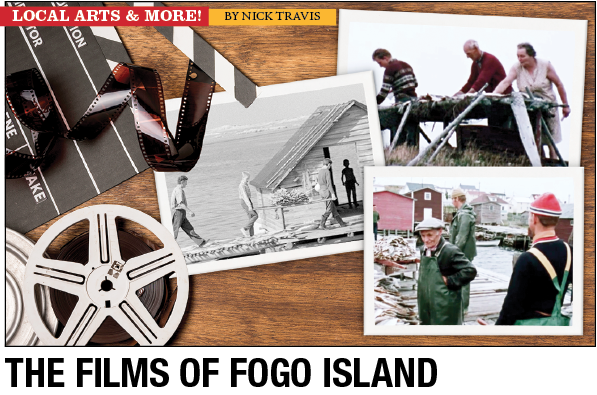A team at MUN revisits a series of films that document the struggles of Fogo Island
===
In 1967 filmmaker Colin Low, community worker Fred Earle and Memorial University’s Donald Snowden created a series of 27 films centred around the towns of Fogo Island in partnership with MUN’s Extension Program and the National Film Board of Canada. These films were part of the NFB’s “Challenge for Change” program, which used media to highlight social concerns within various communities around Canada. In essence, it gave a voice to the voiceless.
Island without a voice
At the time, the communities of Fogo Island were voiceless. The island’s main source of prosperity, the inshore fishery, had collapsed. People were poor, struggling and the threat of government resettlement loomed over their heads.
 These 27 short films were first screened to the people of Fogo Island, who for the first time were able to see that their struggles were felt by everyone on the island, not just a select few communities. This sparked conversations and ideas that would lead to the revival of Fogo Island from what may have been its demise.
These 27 short films were first screened to the people of Fogo Island, who for the first time were able to see that their struggles were felt by everyone on the island, not just a select few communities. This sparked conversations and ideas that would lead to the revival of Fogo Island from what may have been its demise.
Out of this collaboration came the Fogo Island Co-operative Society, a fishing co-op which has not only helped the island community survive, but thrive.
Today, Fogo still profits from the bounties of the sea. From cod, to capelin, to crab, to sea cucumber – there’s not much that isn’t processed in this far-flung corner of the world.
Revisiting Fogo
Just over half a century later, Memorial University is taking a second look at Fogo Island with the help of some footage from the original Fogo Island films blended with a modern-day retrospective from people who would have been children or young adults at the time.
Derek Norman, the coordinator of the Digital Research Centre for Qualitative Fieldwork and Jeff Webb, a professor of history at MUN, have been spearheading this second look at the people of Fogo Island.
Norman had many years of experience working with the MUN extension program. 18 years ago, he set up the Digital Research Centre as part of the Humanities and Social Sciences program. Webb’s work as a historian has centred around how broadcasting allows society to communicate its values, which lead him to the work of the MUN Extension Program. “It’s just been one continuous carrying on of the same sort of thing, which is bringing the media tools into the hands of people,” said Norman.
This update on the films provides a before and after on the lives of Fogo Islanders who were children in the late 60’s, most of whom still live there.
“One of the really rewarding things about the experience is we were able to go back to some of the children that were featured in the early films and see that they’re still there 50 years later,” said Webb. “They’ve made a life for themselves there. We were able to continue the story after all this time. So that was particularly rewarding for us to go back there and film as part of the continuum”
Changing times
At the time of the original Fogo films, their way of life was undergoing rapid change. Salt fish was no longer in high demand, as technology allowed for fresh fish to be kept longer. This resulted in a need for longliners and fishing plants, which couldn’t have been achieved without the fishing co-op, and by extension the Fogo Films.
Norman thinks the people of Fogo are now prepared and resilient enough to faces any changes that come their way in the future.“There’s going to be more challenges like that in future, but it seems that the people there have the awareness to see challenges to meet them.”
Through this new film, Webb and Norman want to highlight MUN’s approach to helping the people of Newfoundland and Labrador.
“Memorial University has had a very inventive relationship with the people of the province, a very responsive relationship,” said Webb.
“Listening to people, understanding people’s problems and helping them to find their own solutions to the problems is more likely to succeed than deciding what the solution to their problem is and try to impose it on them.”
